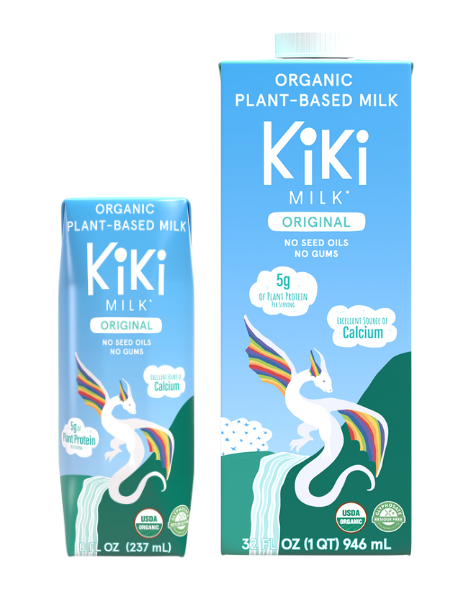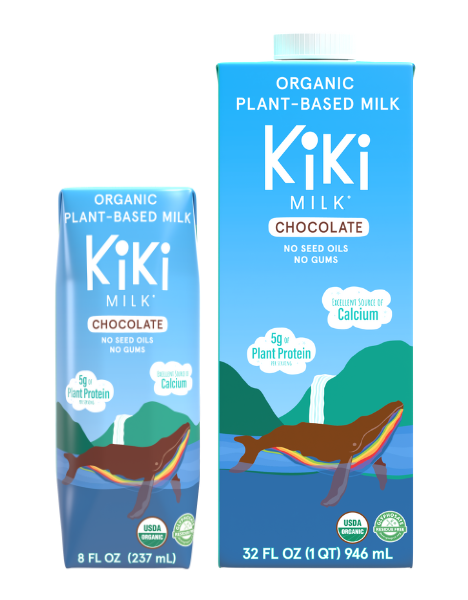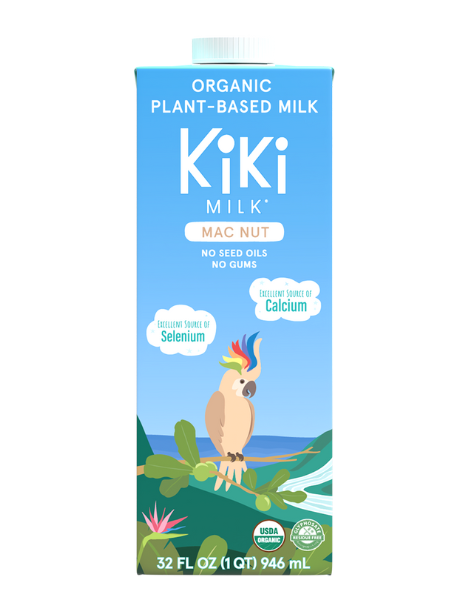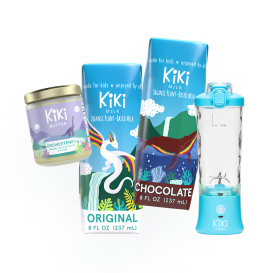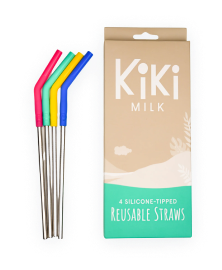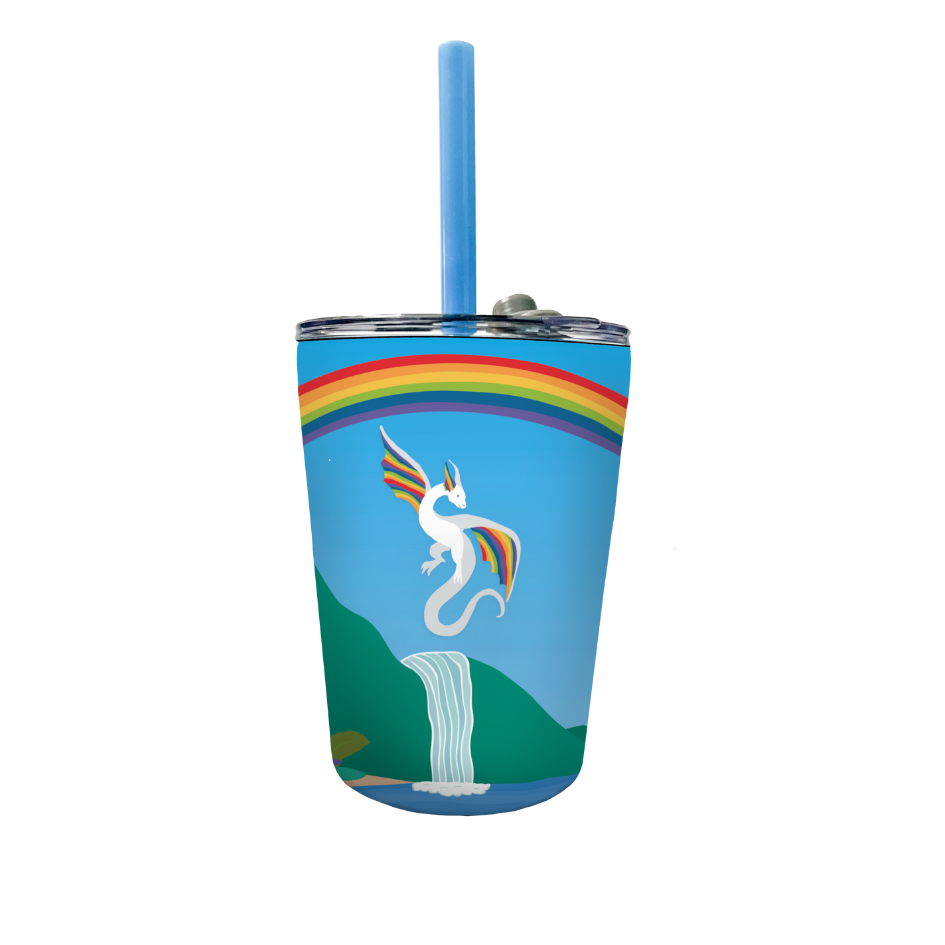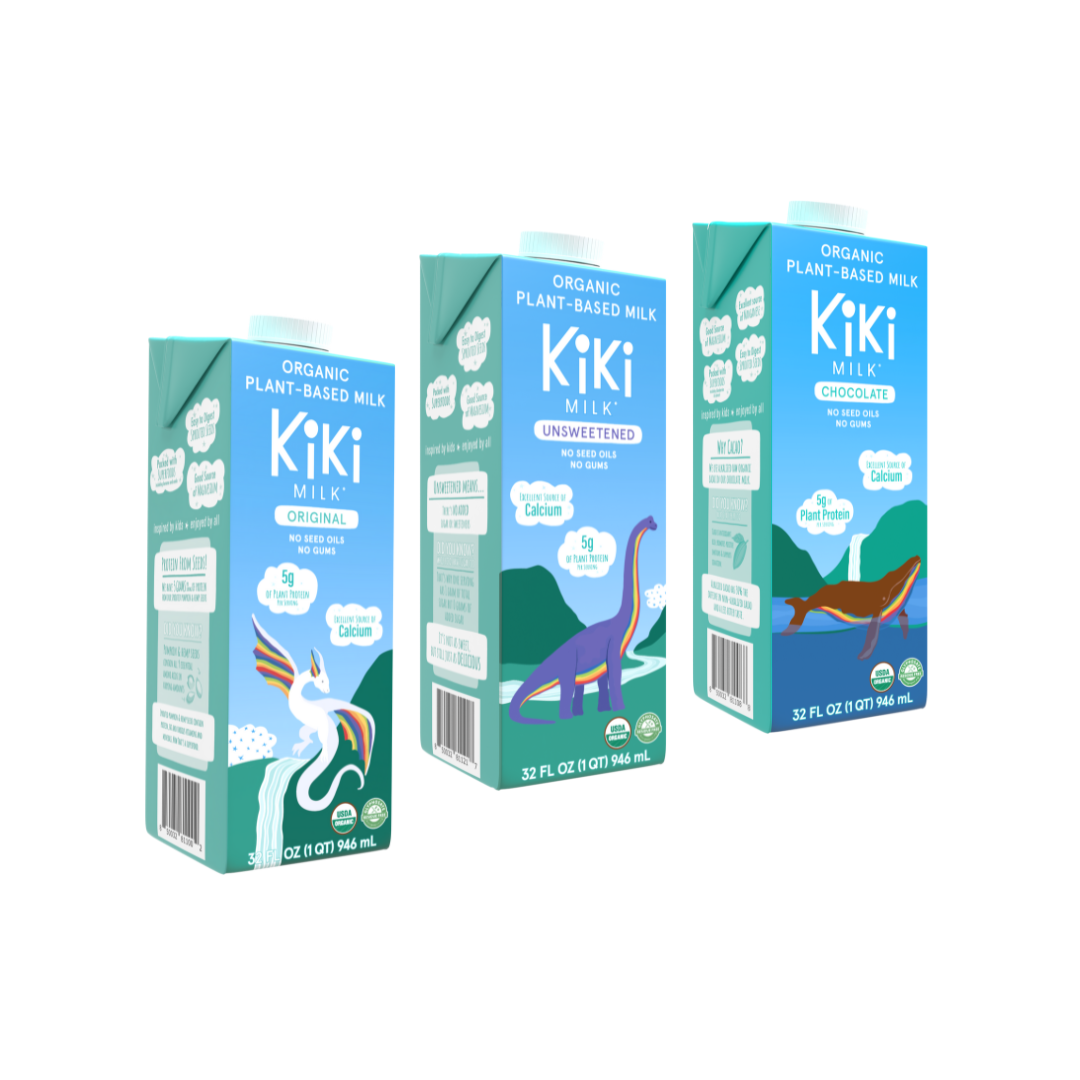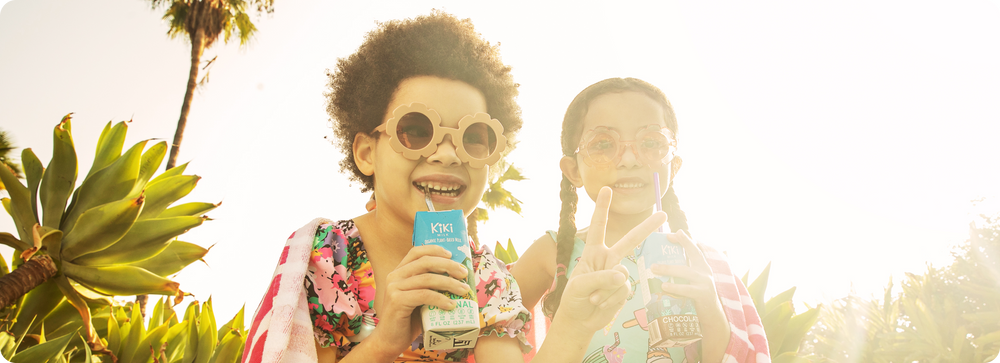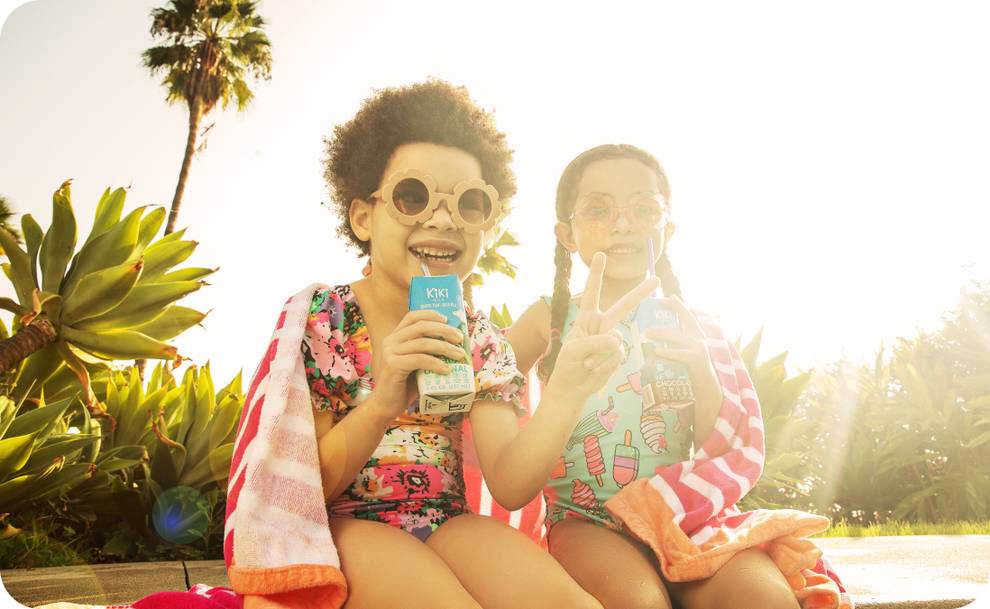This insider look into why Kiki Milk costs what it does covers the following:
⭐ INTENTIONAL INGREDIENTS (WHAT’S INCLUDED AND AVOIDED) shares how each and every whole food in Kiki Milk has a purpose and why we choose not to cut costs with regards to these ingredients.
⭐ MINDFULLY SOURCING OUR ORGANIC WHOLE FOODS shares how we vet our USDA Certified Organic Farms and ensure our product is 100% Glyphosate free.
⭐ PARTNERING WITH PLANET FWD highlights our involvement with a company that helps us find ethical, climate-friendly suppliers and supports our path toward becoming carbon neutral.
⭐ ON THE PATH TOWARD CARBON NEUTRALITY shows our trajectory toward net-zero and shares our offset partner’s world-changing mission.
⭐ KIKI MILK’S PURPOSEFUL PACKAGING explains how our packaging is just one more place we’ve chosen to be intentional, including using cardboard over plastic, reducing waste, and lowering our emissions.
⭐ MAKING KIKI MILK ACCESSIBLE FOR YOUR FAMILY introduces our 32-ounce container (coming summer 2022!) and subscription option.
⭐ Finally, OUR BIGGER VISION shares how we’re working on becoming government-certified as part of the EBT (Electronic Benefits Transfer) system and SNAP (Supplemental Nutrition Assistance Program), along with how you can contribute to the conversation.
WHY KIKI MILK COSTS WHAT IT DOES (AND OUR BIGGER VISION)
The short of it:
Here in the lively world of Kiki Milk, there's a reason behind everything. From nutrient composition to ingredient selection, sourcing and packaging, all things are done with intention. Mother Nature is our role model and our biggest ally when it comes to making products that are uncompromising in taste, nutrition, quality, and safety. On a mission to benefit the health of families and our planet, it’s this mindful determination that means less worrying – and more playing – for our Kiki community!
This determination also has an impact on cost. The intentionality and goodness packed into the Kiki Milk carton come at a higher price. However, that higher price point is not about lining our pockets – it’s about keeping our bar high. That’s why we want to give you an insider look into why Kiki Milk costs what it does and the steps we’re taking to make it more accessible for you and your family.
SO… WHAT GOES INTO KIKI MILK?
➡️ Well, it’s mostly oats (+ seeds), the certified glyphosate-free kind, which 99% of oats on the market are NOT.
Kiki Milk was founded by the strongest force in the world: a parent's love for their child. The Founders' son had a dairy and soy aversion, and there was simply no milk they felt comfortable giving him. What started in their home kitchen out of necessity has since expanded into a bigger desire: to give other parents a convenient, healthy product they can buy with confidence.
Accessibility continues to be one of the company’s top priorities. We want to get Kiki Milk in the hands of those who need it. Yet, at the same time, we have very high standards regarding product quality – standards we’re simply not willing to compromise on. As a business, this presents us with some tough choices.
Simply put, there are things that go into making a certified-organic, nutrient-dense product that is expensive. Like what ingredients we source, where we source them from, the certifications our farmers need, how they pay their employees, and our third-party Glyphosate residue-free testing process. Not to mention our carbon offsets and the additional things we do to be a climate-friendly business.
As one of our valued community members, we want to share it all with you right here. So… what goes into Kiki Milk? To see what’s in the carton, we begin with the soil.
INTENTIONAL INGREDIENTS (WHAT’S INCLUDED AND AVOIDED)
➡️ Aside from the quality of our ingredients, the density of ACTUAL food in our milk is higher than any other plant-based milk. Other plant-based milks have 2% food to water.
We’re proud to say it – we use really good ingredients. Each and every whole food included in Kiki Milk has a purpose (yes, every single one!), ensuring a beverage that’s packed with nutrient-dense benefits. The truth of the matter is, ingredients like organic sprouted pumpkin seeds and organic hemp seeds are expensive. You simply can’t get these high-quality, certified organic, pure foods without a higher cost.
Let’s address the obvious question: Could we cut the costs of our ingredients? If your family's health weren’t a priority, sure we could. But we’d be succumbing to what much of the industry already does – using fillers like gums, emulsifiers, stabilizers, oils or lecithins, refined sugars, flavors, colors, and preservatives… along with conventional and non-organic GMO foods... Basically, anything other than whole food, non-GMO, organic ingredients. This is something we refuse to do. And that’s a big part of why Kiki Milk is more costly.
Kiki Milk contains zero additives, plain and simple. In fact, we actually started with a list of “NO” ingredients prior to deciding what should go into our delicious, wholesome milk. That’s how much we care about not putting weird stuff in our product (and your body). Instead, we chose ingredients that are nutrient-dense right from the beginning. And these pure foods are, inherently, more expensive.
We’re intentional with every decision. Let’s take those organic sprouted pumpkin seeds, for instance. Our little customers have developing tummies, and using “sprouted'' seeds increases digestibility. We could choose non-sprouted pumpkin seeds, but since we know sprouted pumpkin seeds are easier to digest and have slightly higher nutrition benefits, and these components matter to us, we’re not open to settling for less than.
Like we said before, there's a reason behind everything. And prioritizing your family’s health is how we roll.
This brings us to the next part of our journey: the best ingredients aren’t found everywhere. Let’s talk about how we source the cleanest, organic whole foods for each and every carton.
So why don’t all companies prioritize this? Well, they don’t have to, and it ultimately makes them more money. They can sell a product with very little food density, trick our minds and taste buds into thinking it has food in it by using natural flavors and emulsifiers, and then marking it up, cost-wise, to make a big profit. When in reality, it doesn’t cost them very much to actually make the product.
MINDFULLY SOURCING OUR ORGANIC WHOLE FOODS
➡️ It’s NOT as simple as ‘sustainable’ farming and organic sourcing. This isn’t enough. Regenerative practices will make the difference for our bodies and the planet.
So, how do we choose where these wholesome foods come from? How do we vet our farms and their practices?
For starters, we have blanket standards we’re committed to upholding, and we source only from farms that meet this criteria. Our minimum requirements insist that farms…
- Are Certified Organic by the USDA
- Practice sustainable and/or regenerative farming
- Pay more than fair wages to employees
- Have a reputation for treating employees well
In actuality, it is expensive for farmers to obtain organic certifications. The process is costly and not necessarily supportive of farmers. So for many growers, it doesn’t make sense to acquire this stamp of approval, even if all of their practices meet “organic” standards. Kiki Milk is a USDA Certified Organic product, and we only buy ingredients grown on USDA Certified Organic farms. Naturally, this requires us to pay a higher cost to purchase from and support these growers.
Since we source only organic foods, one could assume there’s no Glyphosate (the most widely used herbicide on American farmland – and one we don’t want anywhere near our food) in our milk. However, we don’t stop there. We go above and beyond to ensure the milk you’re drinking is Glyphosate residue-free.
Though organic farms are required to test for this chemical a few times a year, it doesn't guarantee that trace amounts aren’t creeping into our foods. Depending on their proximity to non-organic farmland, run-off and weather patterns can still contaminate organic crops.
It’s rare a company will go the extra step for third-party lab testing to ensure a product is 100% Glyphosate free. But when it comes to supplying nutrient-dense foods to vulnerable populations – like kids with developing immune systems and those with autoimmune concerns or living with cancer – this is vital.
Therefore, we pay out of pocket for an independent company to test our finished product. This allows Kiki Milk to be safe, clean, healthy, and certified Glyphosate Residue Free through The Detox Project. In terms of purity, we consider going above and beyond one of the blanket practices we’re committed to upholding.
You can see how choosing our vendors is a complex process – with high stakes. (We’re talking about your family’s health, after all.) So we’re fortunate to partner with a fantastic company that assists in vetting our growers.
PARTNERING WITH PLANET FWD
➡️ Did you know that regenerative farmers use 'intercropping'– a planting technique based on how well crops will support each other and the greater ecosystem on the farm? Pretty neat!
Planet FWD helps us find ethical, climate-friendly suppliers that meet our requirements. This company maintains a database of incredible farms that practice regenerative agriculture and preserves a connection with them to ensure ongoing commitments to these high standards.
In short, Planet FWD does a deep, thorough dive into potential farms and provides suggestions. We follow up by looking into each grower’s practices before the fun part happens. That is, we sample each ingredient and decide… What tastes the best?
Though that’s not all Planet FWD does. They also support our path toward becoming a carbon-neutral company.
ON THE PATH TOWARD CARBON NEUTRALITY
➡️ ‘Climate friendly’ is good, but reducing overall emissions is where the impact lies… a big way to do that is with offsets. And true offsets cost companies money.
The journey toward carbon neutrality requires an energy-intensive, multi-step process. This includes an assessment of our full supply chain (to determine the climate impact at each product lifecycle segment), an emissions reduction plan (to provide a map of where emissions can be reduced the following year, if possible), and purchasing offset credits. Let’s talk about that last step.
Unfortunately there will always be emissions, as we’re pulling from the earth to create something. (Lucky for us, it happens to be earth’s most miraculous gifts – real food!) For the emissions we can’t eliminate, Kiki Milk purchases “offset credits”. These allow us to give back to the environment by partnering with a company – one doing something to lower emissions in the world.
Planet FWD assists in this entire process, guiding us toward our goal of carbon neutrality by measuring our baseline footprint and providing recommendations where we can make emissions reductions. What’s more, they’ve also paired us with our world-changing offset partner, Tradewater.
Tradewater collects and responsibly destroys refrigerants – the chemicals utilized in car cylinders, refrigerators, AC units, and other cooling systems. If that doesn’t sound like a huge deal, get this: refrigerant emissions actually trump all emissions released from automobiles and the cattle industry… combined.
These chemicals have since been banned, however there’s no process established for eliminating existing chemicals from the environment. Old cooling systems are scattered throughout the world; eventually, they rust and leak, and chemicals leach into the atmosphere. This sequence of events is ten times more damaging to the ozone layer than carbon. Tradewater’s mission of finding and responsibly destroying the most potent greenhouse gasses – before they are released into the atmosphere – is one we are proud to support.
As you can see, our business does not choose the path of least resistance. (Check out our 2022 Impact Report to follow our path to net zero!) And striving for carbon neutrality with every product we create does affect our overall cost. However, we care about what we pull from the earth, who it affects, and what we put back into it – to make the world a better place for all.
KIKI MILK’S PURPOSEFUL PACKAGING
➡️ 6 pack vs 12 pack? We made the decision not to include unnecessary plastic.
All of that goodness – along with the intentionality behind it – gets packaged into a colorful carton. One where the Kiki world comes to life for both kids and adults. Our packaging is just one more place we’ve flexed our mindful muscles as a business.
You may notice that Kiki Milk is currently not available for purchase in a 6-pack. This is because our options for 6-pack packaging would utilize plastic wrap, whereas our 12-packs arrive in corrugated cardboard. Put simply, we aren’t willing to contribute to a world with more plastic.
Our manufacturing and co-packing facility itself is a very cool and unique place. They're located on the Niagara Power Grid, which allows them to run on hydropower and use renewable energy. (We consider this a huge win since electricity production is 25% of the United States’ GHG emissions; switching to renewable energy is one of our biggest levers for tackling climate change.) And because they double as our manufacturers and co-packers, we significantly reduce our transportation and emissions. Our yummy milk simply moves from one room to the next, and makes its way into the carton!
Here’s another environmental win: our facility’s aseptic process ensures that both food and packaging materials are free of harmful bacteria when food is packaged. This means Kiki Milk TetraPak cartons are shelf-stable and don't require refrigeration to stay fresh. Not only does this reduce food waste, it also lowers emissions on all sides. On the retailer’s end, your (the consumer’s) end, in fulfillment warehouses, and during transport.
We’re pretty proud of passing these packaging savings (and environmental benefits) off to you. Though we know many of our customers would appreciate having additional ordering options – especially if you have yet to sample our delicious flavors! (On that note… Did you know you can order a Kiki Milk Sample Box? That’s right! You can try out two Original cartons and two Chocolate cartons before falling in love with our 12-pack.)
Well we have good news… Exciting things are in the works when it comes to accessibility.
MAKING KIKI MILK ACCESSIBLE FOR YOUR FAMILY
➡️ Bigger catrons and/or subscription model.
We truly care about getting Kiki Milk in the hands of more families; ones that could benefit from this organic nutrient-dense milk. Two options available to you include choosing a 32-ounce container (coming summer 2022!), and/or our subscription option. Both make Kiki Milk more cost-effective!
- The 32-ounce size is more economical per ounce, more environmentally friendly from a packaging perspective, and caters to families that prefer buying in bulk
- Our subscription model offers Kiki Milk at a discounted price, with the convenience of shipping it to your door
- If you want the most bang for your buck, combine the 32-ounce option with a subscription delivery!
Whether you choose our 12-pack cases or 32-ounce cartons, you won’t have to worry about reordering. Just set your delivery up in a few clicks – and stay playing!
We are working hard to make all of our products affordable for everyone. We need everyone's help to create economies of scale. When we buy in bulk we get better prices, spread risk out, create production efficiencies, and find cheaper capital. All of this helps us produce more for less passing savings on to our customers.
Planet friendly note: For environmental reasons, we recommend subscribing for 4 cases, 1 time per month (as opposed to 2 cases, every 2 weeks). This simple switch reduces the transportation required, thus lowering emissions and your order’s overall carbon footprint.
OUR BIGGER VISION
➡️ We want to be a part of SNAP and think outside the box with a unique give-back
One thing we’re currently working on is becoming government-certified as part of the EBT (Electronic Benefits Transfer) system and SNAP (Supplemental Nutrition Assistance Program). This is a rigorous and time-intensive process. However, we hope Kiki Milk will eventually be an option for those seeking nutritious, government-assisted foods; and we believe we can make a positive impact on the health of these families.
We’re also testing out an internal “give-back” program, which will allow our customers to sponsor another family through product donation, or by giving an extra dollar at checkout toward a community fund. If you have any thoughts on this, we’d love to open the conversation within our community. (We have a feeling there are some fantastic ideas out there!) Our wish is to benefit more families seeking a delicious milk-alternative, and reconnect them with the magic of nature.
